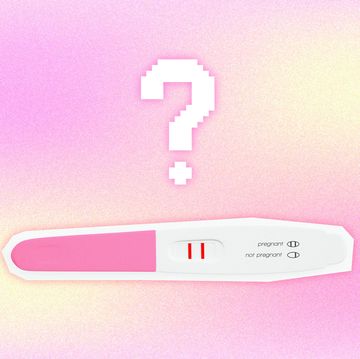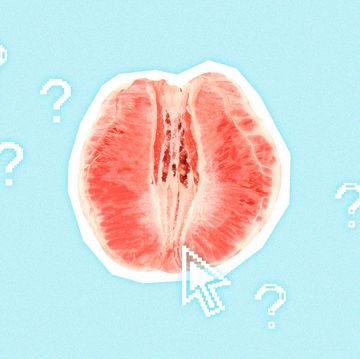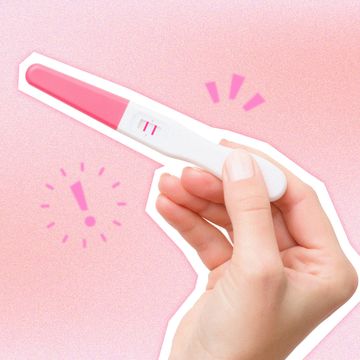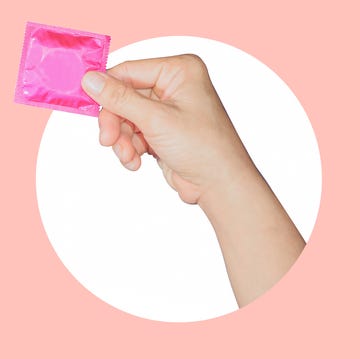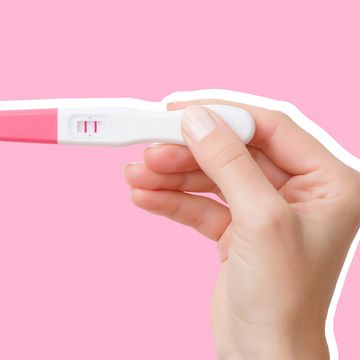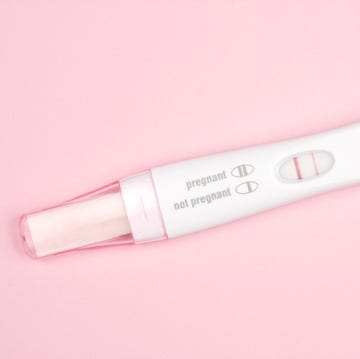You may know the basics of having a period. Common symptoms are cramps, sore boobs, and feeling bloated. Bleeding typically lasts two to seven days each month, and it’s usually heaviest in the first couple of days. But what does it mean when you experience period symptoms but no period? Is it even possible to have a period without bleeding?
First, when discussing the menstrual cycle, it’s important to understand the difference between menstruation and ovulation. So, let’s review. Ovulation is when your ovary releases an egg for fertilization. Menstruation is what we refer to as our period, aka the bleeding that occurs when an egg that’s released from the ovary isn’t fertilized. Your uterine lining sheds, meaning the blood, nutrients, and tissue leave through the vagina because your body no longer needs them. This brings us back to the question of whether or not you can have a period without blood. Below, we talked to the experts and break down the answer.
Is it possible to have a period without bleeding?
The short answer is no, it’s not possible to have a period without bleeding. “By definition your period is the shedding of the lining of your uterus,” Dr. Carolyn Moyers, OB/GYN at Sky Women’s Health in Fort Worth, Texas, explains. The menstrual blood flows from the uterus to the cervix and out through the vagina, she says. If you’re not bleeding, then you’re not having a period, she adds.
Because menstruation = blood, it’s extremely rare to have a period without blood. One way you might not see period blood is if your hymen is still intact, Dr. Natasha Bhuyan, family physician at One Medical, says. This is called an imperforate hymen, and can be remedied with a simple procedure. Another anomaly that might inhibit bleeding during a period is a condition called Mayer–von Rokitansky–Kuster–Hauser syndrome, which is also known as a mullerian anomaly, Dr. Hina Talib, a board-certified pediatrician and adolescent medicine specialist based in New York City, says. “With mullerian anomalies, you either are born with a vagina but without a uterus, or with a uterus but the vagina that doesn’t open all the way,” she explains. “Both [conditions] are super rare.”
There are other reasons why you may experience period symptoms but no period, or miss a period — keep reading for the details.
What does it mean when your period is late, or you miss a period?
“Your menstrual cycle can be very sensitive to changes in your body or changes in your mental health or your environment,” Dr. Talib explains. “There are medical reasons, mental health reasons, and nutritional reasons that could all impact why you might miss a period.”
Experiencing significant stress can lead to a missed period, as could excessive exercise or drastic weight change. Polycystic Ovary Syndrome (PCOS), a condition that affects your hormone balance, is another reason why you might not have a period. A chronic medical condition like diabetes or a thyroid condition can also be the underlying cause, Dr. Talib explains.
If you miss a period, you could be experiencing an anovulatory cycle, Dr. Moyers says. “An anovulatory cycle is a menstrual cycle in which ovulation, or the release of an egg from the ovaries, does not occur,” she explains. Anovulation can be caused by the reasons listed above, i.e. particularly high stress levels, extreme exercise, and major weight fluctuation.
If you recently started having periods, it might take your body a bit to adjust to a regular pattern. Irregular periods can be common in the beginning, according to the Mayo Clinic, because your body isn’t yet ovulating monthly. “Somebody could have a first cycle and then not bleed for a while,” Dr. Moyers explains. “It may take a couple of cycles for them to start having regular, predictable cycles when they’re young and just starting their menses. But after that, you should have regular menstrual cycles. If that’s not happening, then you should see your gynecologist.”
Another reason why you might see minimal bleeding, or miss a period, is because you take hormonal birth control. “When people are on birth control, it suppresses ovulation, so they don’t release an egg,” Dr. Bhuyan says. “They’ll still bleed, but often lighter.” That lighter period is called withdrawal bleeding, or a “fake period.” If you have a steady stream of hormones in your body, during your period week (where you might take your placebo pills), your body mimics that drop in estrogen and progesterone, which causes the bleeding.
Perhaps the most well-known and common cause for a missed period is pregnancy. Once an egg has been fertilized by a sperm cell and implants in the uterus, hormones are released that stop the shedding of your uterine lining, meaning you don’t have a period, according to Planned Parenthood.
There are a number of reasons why your period is late or why you might have missed your period, so it’s always helpful to track your cycles either on a calendar or on an app. Once you see that pattern, you can anticipate when your menstrual cycle will begin. But if you experience symptoms that are out of the ordinary for you, you should see your doctor to figure out if the issue is related to hormones, periods, or another condition. “If you’re going months without a cycle, then you’re not ovulating. Something is off, and you need to see an OB/GYN,” Dr. Moyers says.
Yerin Kim is the Assistant Editor for Snapchat Discover at Seventeen, covering beauty, sex & health, lifestyle, and entertainment. Originally from New Jersey but raised in Seoul, she is a proud Syracuse grad who loves fluffy puppies and a good Instagram opp. Follow her on Twitter and Instagram!
Leah Campano is an Associate Editor at Seventeen, where she covers pop culture, entertainment news, health, and politics. On the weekends, you can probably find her watching marathons of vintage Real Housewives episodes or searching for New York City’s best almond croissants.



